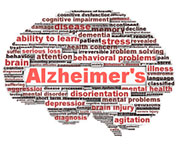- Could Artificial Sweeteners Be Aging the Brain Faster?
- Techniques for Soothing Your Nervous System
- Does the Water in Your House Smell Funny? Here’s Why
- Can a Daily Dose of Apple Cider Vinegar Actually Aid Weight Loss?
- 6 Health Beverages That Can Actually Spike Your Blood Sugar
- Treatment Options for Social Anxiety Disorder
- Understanding the Connection Between Anxiety and Depression
- How Daily Prunes Can Influence Cholesterol and Inflammation
- When to Take B12 for Better Absorption and Energy
- Epsom Salts: Health Benefits and Uses
Heart Disease, Alzheimer’s Linked by Common Risk Factors


Some risk factors for heart disease may also be linked with Alzheimer’s and other types of dementia, a new study reports.
“We already know that vascular risk factors damage the brain and can result in cognitive [mental] impairment,” study lead author Dr. Kevin King said in a news release from the journal Radiology.
“Our findings give us a more concrete idea about the relationship between specific vascular risk factors and brain health,” said King, an assistant professor of radiology at the Keck School of Medicine at the University of Southern California, Los Angeles.
The study was published in the July 28 issue of the journal.
Prior research has linked heart risk factors and mental decline, but this study focused on specific risk factors and three brain structures — the hippocampus, precuneus and posterior cingulate cortex — that play a role in memory.
The analysis of data from more than 1,600 adults in the Dallas Heart Study showed that alcohol use and diabetes were associated with smaller total brain volume. Smoking and obesity, meanwhile, were associated with reduced volume in the posterior cingulate cortex, which is involved with memory retrieval, and emotional and social behavior.
Alcohol use and smoking were linked with reduced volume in the hippocampus, and obesity and high fasting blood sugar levels were associated with reduced precuneus size, according to the study.
The findings also suggest that reduced hippocampal and precuneus size may be early indicators for mental decline in people 50 and older, while reduced posterior cingulate size is a better predictor of mental decline in people younger than 50.
“We currently do not have effective treatments for Alzheimer’s disease, so the focus is on prevention,” King said.
“In the future, we may be able to provide patients with useful and actionable information about the impact different risk factors may be having on their brain health during routine clinical imaging,” he explained. “And since no special imaging equipment is needed, there is a great potential to provide this service at many centers.”
More information
The U.S. National Institute on Aging has more about Alzheimer’s risk factors and prevention.
Source: HealthDay
Copyright © 2026 HealthDay. All rights reserved.










